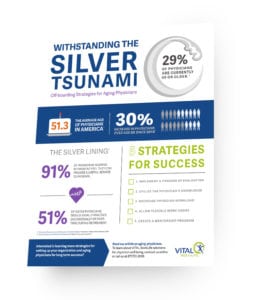 The American medical profession is aging at a rapid rate. In 2015 nearly one in four practicing physicians was at least 65 years old, prompting many to question whether a mandatory retirement age should be set in place.
The American medical profession is aging at a rapid rate. In 2015 nearly one in four practicing physicians was at least 65 years old, prompting many to question whether a mandatory retirement age should be set in place.
The graying of the profession has lead to concerns about quality of care and patient safety. These aging physicians pose certain challenges to organizations looking to plan for the future, however, with those challenges come promising opportunities for growth as well.
The Silver Tsunami
An analogy referring to the rapid aging of populations, the silver tsunami is leaving a flood of complications in the healthcare industry. As the impending exodus of older physicians nears its date, it’s crucial your organization learns the proper steps to remedy the issue.
Although blanketed in controversy, remaining alert to the reality of the dilemma directs organizations to create a plan of action for the near future.
The Silver Lining
As is true of most hardships seemingly daunting at first glance, the silver lining is hidden in the details. Physicians of all ages view their occupation as a part of their being. This leaves opportunities for employment further down the line in varying capacities.
An outstanding 91% of physicians nearing the age of retirement feel as if they can provide a useful service to their patients. 51% of physicians would ideally practice occasionally or part time during post-retirement.
Strategies for Success
The question becomes, then, how can organizations retain aging physicians and take advantage of their value? A few strategies that have seen tremendous success include:
- Implementing a process of evaluation: Having a plan of evaluation in place can prevent unwanted conflict in the future.
- Decrease physician workload: Minimizing the tasks assigned to aging physicians alleviates stress levels.
Download the infographic to learn additional insights and strategies regarding the aging physician and how to begin setting your organization up for long-term success.



